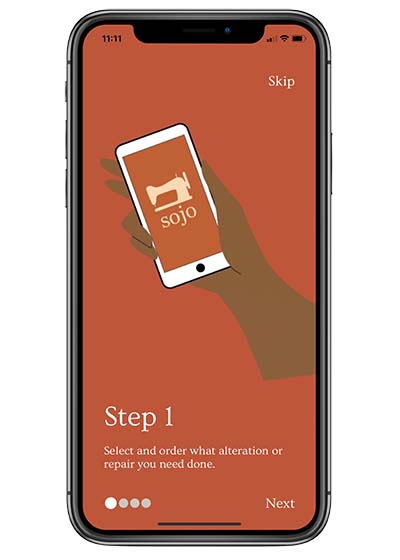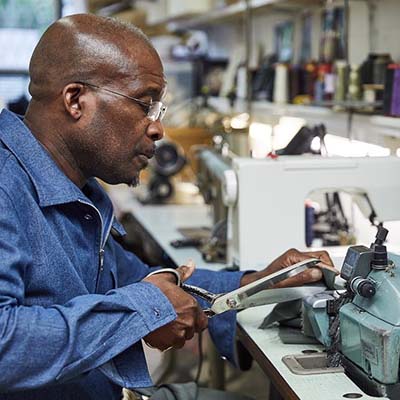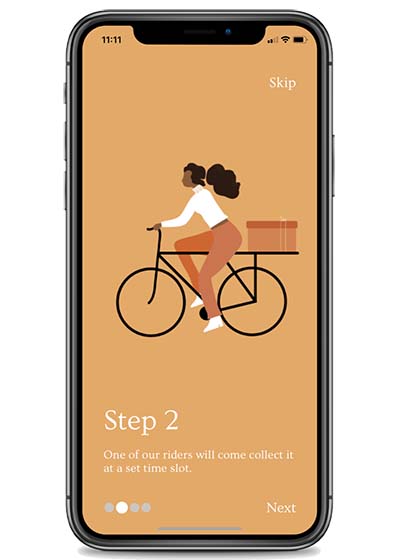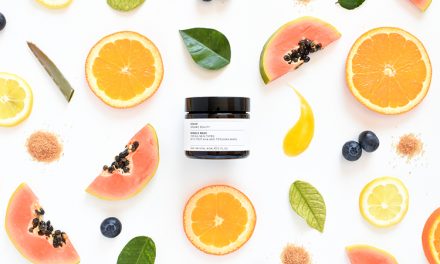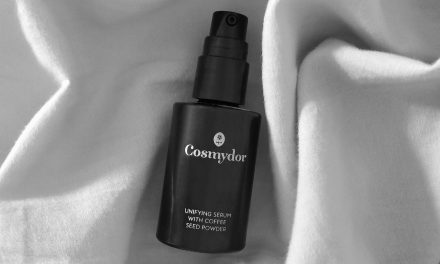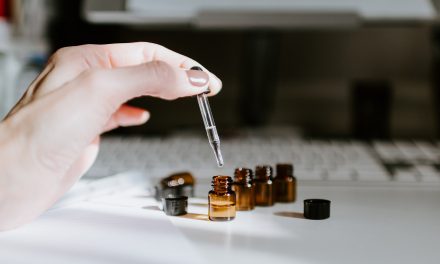10 Questions For Sojo App Founder Josephine Philips
All Images: Sojo App
Sojo is the new app making clothing alteration and repair a convenient and exciting experience. We asked founder Josephine Philips 10 Questions about starting her first brand & democratising fashion.
Convenience is now a way of life. Want to rent your wedding dress? Theres an app for that. Want to sell your old clothes to someone else, there’s an app for that too. But what if you have stuff you already own that you aren’t wearing simply because it has a defect or doesn’t fit in quite the right way? Josephine Philips is a hungry entrepreneur with a vision for a slower, more sustainable future. She doesn’t believe that cost or body size should be barriers to you enjoying second hand or vintage shopping. So she created Sojo, “think ‘Deliveroo’ but for clothing alterations.” Off the back of a successful lockdown launch, Josephine took the time to speak to us about her amazing journey. Not only is it an inspiring story of perseverance but also of optimism for a more conscious future.
The Vendeur: What inspired you to start Sojo?
Josephine Philips: About 2 years go I moved away from fast fashion because it didn’t align with my feminist values. Hearing about the plight of garment workers was really upsetting and I didn’t want to be part of the problem. At the time I was a student studying physics and philosophy. However as much as I enjoyed the subject, there was no way I was going into physics as a career. It’s not my calling. At the time I was doing a lot of second hand shopping at charity shops, vintage markets and on Depop. I did it because it was more sustainable but also more suited to a student budget. However I was always finding amazing stuff that wasn’t in my size. I bought things with the intention of altering them but didn’t always get around to it. Sometimes it was a time constraint, sometimes I just didn’t know where to look for the service I needed.
I started thinking about how convenient it would be to be able to fix this problem on my phone. I can order food, book a cab, rent a holiday home, why can’t I get my clothes altered too? I felt it was important to make second hand shopping more size accessible for people, as well as to improve the circular economy so I went for it. I may have studied Physics but Sojo is my mission and journey and I’m passionate about being an entrepreneur.
TV: Was Sojo always going to be an app?
JP: Yes and no. When I initially got started on the tech side of the business, I realised that building a website was going to be much easier than building an app. So I set out to create a website for Sojo because of time constraints. I was lucky that in the end a developer wanted to work on the app because they were passionate about it too. Both were built alongside each other.
TV: How do you see Sojo playing a role in helping people to wear their clothes for longer?
JP: I see it helping in two key ways. The first is repairs. For a lot of people if something rips or breaks, they never get around to repairing it. It just gets shoved in a bag or at the back of your wardrobe and forgotten. Sometimes it even goes into the bin. I want people to have a better option than this. We give people a hassle free way to get their repairs and alterations sorted by professionals. This also means that the garment is repaired well and will last longer. Secondly, I think that there is a lot to be said for well fitting clothes. They will be loved and taken care of better than something that doesn’t make you feel fabulous. Going through the time and effort of altering something increases the likelihood that you’ll keep the piece longer. We’re also size inclusive because with second hand clothes, there aren’t the same size options as when you shop fast fashion. Of course it’s easier to size down than up, but we are making an effort in that area too. The plan is to let people include extra fabrics in their order so we can size up and down. I’m also looking at partnering with fabric shops as an option too.
TV: If someone wasn’t convinced of second hand shopping, how would you persuade them of how amazing it is?
JP: I think the thing I feel passionate about is that second hand clothes are unique. When shopping fast fashion, you’re highly likely to see someone else wearing the same piece as you, if not the same look! With second hand and vintage shopping, you’ll find pieces that have their own narratives from maybe 20 years ago. That makes it totally unique to you. In addition, you’re likely to feel more connected to a unique piece of clothing than a cheap coat all your mates have too. You’re cultivating your own style in this way. Before my switch from fashion fashion, I’d dabbled in preloved clothing before. I started selling clothes on Depop at Uni as a hobby. A friend told me it was a good way to make extra money as a student. I would go to kilo sales, clean everything up then sell them on Depop. Prior to that, I had a big fast fashion habit. I was just unaware of the issues. However as I got into it, I really enjoyed the community aspect too. It helped me to understand the issues that fast fashion was causing for the planet.
Image: Westway Trust – Steve is a Sojo Seamster working in West London. With 30 years experience as a tailor, your clothes are in very good hands!
TV: What was the biggest issue you faced when setting up the service, it seems like a lot of coordination is involved?
JP: To be honest, as a newcomer to entrepreneurship, I struggled with all aspects of building the business. It’s been and continues to be a massive learning curve for me. With no professional experience post University, I’ve had to work out how to pitch, do social media, build a website and app as well as find money. It was a big challenge. For me, the toughest part was the tech. Trying to convey and explain my vision of the app to someone who would build it was difficult. I had to design the entire app myself right down to designing all the pages and the user experience. However it was also hard to convince the Seamsters of the mission. (Seamsters is the gender neutral term we coined to describe our amazing tailors and seamstresses). I was young and new to the industry. The first person I pitched to asked me how old I was! The entire endeavour has been hard to navigate.
TV: Sojo has been described as the ‘Deliveroo’ of clothing repairs, why do you think convenience is so important?
JP: We are targeting the younger generation with this app. Second hand shopping is big with Gen X but they also shop a lot with fast fashion brands. The convenience economy is growing rapidly. A brand won’t do well if we don’t do a good job of making people’s lives easier. It’s our job to take away the effort involved in repairing and altering your clothes. If you can get everything else through your phone, we have to be able to provide the same convenient service.
TV: Describe a typical day for you?
JP: I don’t really have a typical day now that we have launched, it’s really a mix. However the first two weeks after the app launched I did all off the order pickups myself! I wanted to get to know my clients, to thank them and say hi. I usually wake up very early and start replying to emails, which takes a long time. We have a lot of queries to answer from customers as the app is so new. Plus people reach out to us via social media, and we also have press queries to sort out. I have a lot of meetings during the day too. We are potentially looking for investment to help us grow. I’m also part of an entrepreneur accelerator programme which has lots of workshops which keeps me really busy throughout the day. But I’m really enjoying lots of new things. In the evening, I’ll usually spend some time on social media too. Managing the seamster relations also takes up a lot of time. At this early stage they speak to me directly about orders and it’s important to me that we build a good working relationship. I am also in the process of onboarding cyclists to collect orders.
TV: What was it like to launch a product during Lockdown?
JP: I wanted our Seamsters to know that we could help them during lockdown. For the ones that are on board it has provided them work and orders when they have been forced to close their shop fronts. I’m proud to help them continue in business during this tough time. However it’s also been a prime moment for us to launch a door to door convenience service so there have been positives.
TV: 2020 was a crazy year, and we all became more aware of issues around racism, equal pay for garment workers and fast fashion. What were the positives to come out of the year, apart from Sojo of course.
JP: People and organisations like Black Lives Matter have been pushing for change for years. I think things became more mainstream in 2020 mainly because of the attention that the media focused on these things. There still isn’t enough transparency from fast fashion brands. Although it’s slowly getting better, I hope these new conversations we are having are shifting people’s purchasing power. Sustainable fashion has definitely become more mainstream in the last year.
TV: Currently Sojo is available in Central London, what’s your plan for branching out to the rest of the UK?
JP: We started in London because pre-lockdown, these were the relationships I had built with local Seamsters. So while we are currently in lockdown, going out to other regions of the UK and recruiting local Seamsters isn’t possible. However, once we can prove that our model works in London, we have plans to replicate it across the country. I’m intending to start later this year in Bristol and Brighton.
Disclaimer: The people and models in the images featured are not associated with The Vendeur and do not endorse it or the products shown. This post may contain affiliate links. Prices correct at time of publishing.
Did This Put A Smile On Your Face? Why Not Subscribe?
If you enjoyed this then theres plenty more on our email newsletters that you'll love. Whether you're a sustainable newbie or an eco conscious pro, our bi monthly emails will inspire you to live sustainably and ethically.


